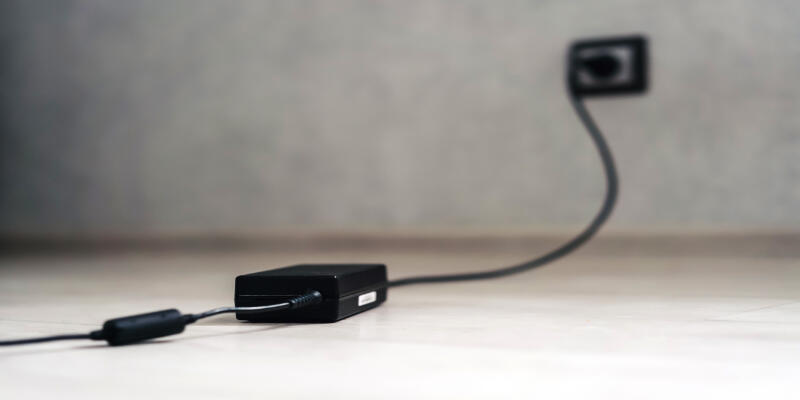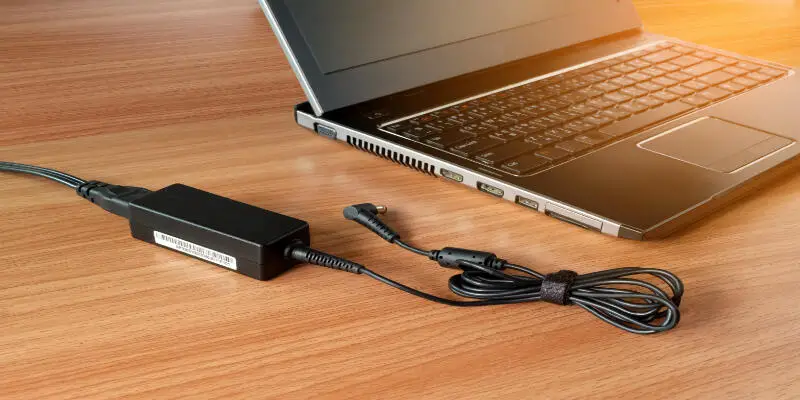Disclaimer: This post may contain affiliate links, meaning we get a small commission if you make a purchase through our links, at no cost to you. For more information, please visit our Disclaimer Page.
Is your laptop power adapter getting hot? This is not a good sign.
If you want to avoid overheating your laptop power adapter, keep it well ventilated. Avoid keeping your laptop plugged in all the time, keep your power cord safe and free from wear and tear. Make sure to avoid using your device while it is plugged in.
Initially, I thought that a hot laptop power adapter is a common thing. Later on, I learned after some trials and tribulations that a hot power adapter needs immediate action.
So, now I will let you know the ways on how to cool your power adapter and ensure it lasts long.
Table of Contents
Laptop Power Adapter Getting Hot
First, let’s understand what we mean by hot about laptop power adapters. When you plug in your laptop charger and turn it on, it gets warm. A partially warm adapter is normal, especially when you are using your laptop and charging it simultaneously.
But if the charger gets extremely hot, you have an issue with an overheated power adapter. I will present a deep insight on how to detect the cause of overheating and resolve it.
Why Is My Power Adapter Overheating?
There are lots of reasons for overheating your power adapter. It will be good to find out about them before we resolve them.
Cheap Or Unreliable Devices
The market has lots of adapters that are dirt cheap and do not meet the set electrical criteria. If your adapter comes under this category, you may need to worry about the safety of your device.
Non-compatible Adapter
If your charger is not compatible with your laptop, it may cause the overheating of the adapter.
Placing Your Charger On A Surface Which Traps Heat
You must have noticed that when you place your charger or laptop on an area that restricts airflow around them, thus causing overheating.
Your bed, sofa, or any other cushioned surface traps the heat of the charging adapter, and hence the temperature increases.
Battery Is At Fault
In some laptop models, the batteries need a high level of current to charge the device. If you own this variant then, the charging current is higher for your device than the rated current of the charger. Thus, causing overheating of the adapter.
If you have recently replaced your battery and are now facing overheating issues, then your battery is of a different compared to the previous one.
Device Malfunction or Abnormality
Overheating of power adapters may be caused by device or power outlet malfunction. It may cause a short circuit thus, causing an increase in temperature.
Is It Bad If My Laptop Charger Gets Hot?
The heating up of your laptop or charger is no doubt annoying, but it has its reasons. The laptop chargers convert analog current into direct current. Transistors and switching IC’s heats most as they are handling the power issues.
The entire circuit board is in plastic with no way of transmitting heat outside, so the adapter tends to heat up even with less workload.
If you are gaming a lot and cannot stop playing on your gaming laptop, even when it is charging, then be prepared for overheating issues.
The battery of such laptops drains quickly because of high processing and your constant use of the device while it is on charging will increase the temperature.
In case your charger is getting a little warm while it is plugged, no need to panic. But if it is too hot to hold, be ready to resolve it before it becomes a big issue.
How Do I Stop My Laptop charger from overheating?
When you notice the adapter is getting pretty hot, then shut off your device and unplug the charger. After some time, again plug it on and monitor the temperature. If the problem persists, then you need to move ahead with the following steps.
Handle With Care
Take good care of your adapter cable, do not let it rub against rough or pointed edges since this may damage the protective rubber coat of the cable.
You should never use a laptop charger if its internal wires are exposed as it poses a threat to your device.
While traveling, keep your laptop and charger securely in a bag to avoid dropping and damaging your charger. Prevent your charger from hitting the hard floor repeatedly.
Do not pack your charging cable firmly, as it can damage the delicate copper conductors present in the cord. While wrapping your power cord, do it differently every time as it will protect your cord from repetitive stress.
Keep It, Airy
While charging your device, ensure that it is in a well-ventilated place. If you leave your plugged-in charger on the bed or under a blanket, it will get overheated. Hence, avoid the areas where your charger will feel suffocated.
If your charger is on and the battery is not charging, take your cursor to the system tray and put it on the battery icon. If you get the message plugged in, and it’s not charging, unplug it, and again use it after some time.
You can increase the airflow around the adapter, by putting some pencils under the transform box of your adapter.
Charge Your Device Regularly
To avoid charging your laptop while it is in use, charge it regularly, especially when you are not using it. Many laptops have good battery backups and can last up to 10 hours or more, thus reducing the need for constant charging.
Use A Power Strip With Surge Protector
Power strips are a great help as they allow you to plug in various devices through one power outlet. If your power strip is having surge protectors then, it will keep your devices safe from power surges that can damage them.
Check Your Laptop’s Battery
Don’t just blame your adapter for overheating but cross-check your laptop’s battery as well. If your laptop has a removable battery, remove it and connect your adapter.
Monitor the temperature, while the adapter is connected to your device. If it remains cool then, you need to replace your battery rather than the charger.
Replace Your Adapter
Just like other electrical equipment, chargers also have a life span and can malfunction. The increase in the temperature of your charger can cause excessive voltage to pass to your device.
You don’t want your laptop to be adversely affected by the overheating of your adapter so it’s better to replace it.
Switch To Power Saver Mode
Choose the most energy-efficient mode for your laptop, thus reducing the need to change frequently.
The Power and Sleep menu, let you choose for a time to automatically shut off your computer, when not in use. For more advanced options, you can go to Additional power settings.
Battery Saver is a recent feature of Windows 10 that limits background app activity and push notifications, saving battery. Avoid using your laptop frequently while it is in charging mode.
Avoid Keeping Your Device On Charger For Long
Even if you are a heavy laptop user, make sure that your adapter is not regularly plugged into your device. Give some cooling time to your charger for its better performance.
Conclusion
If you plan to avoid overheating your adapter, make sure that it is of good quality, wrap it nicely, use proper sockets and avoid excessive use. When your charger is not in use, disconnect it and let it cool down.
If the problem persists, get in touch with a technician.


